Located in Taipei’s East District (東區), Even Select Shop specializes in avant-garde designs, with a focus on Japanese labels. It is Taiwan’s exclusive retailer of Japanese brand Frapbois; other offerings include T-shirts by Play, Comme Des Garcons’ sportswear label, platform shoes by Unbilical & Belly Button and a roster of emerging designers from Europe.
Owner Even Chen (陳儀文) began importing clothing from Japan in 1994, when she was a fashion-conscious 20-year-old, and sold her finds in Ximending, where Even Select Shop still has a store in Shinjuku Plaza (西門新宿) mall. The store opened its East District flagship boutique in July last year.
Chen says she has had a passion for wearing offbeat clothing since she was a little girl.
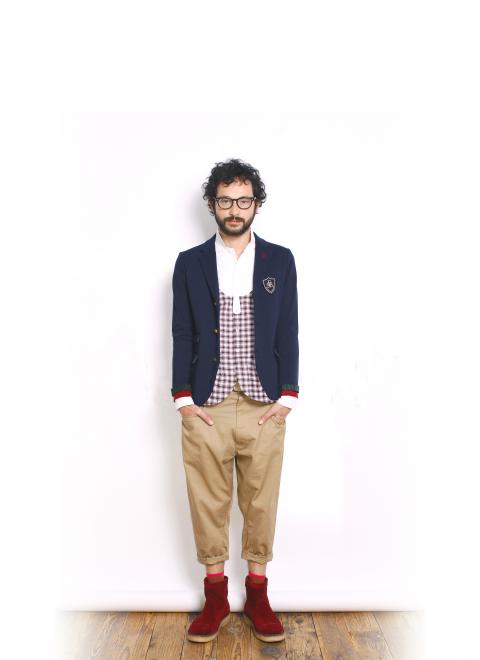
Photo:Courtesy of Even Select Shop
“I just liked dressing up. I was always very vain,” says Chen. She is fluent in Japanese and visits the country once a month to keep abreast of trends. One of her favorite Tokyo neighborhoods is Shinjuku, where Chen takes note of what young hipsters are wearing. She also reads Japanese magazines like So-en, Nylon and Fruits, which is devoted to street style. Current trends Chen likes include duffle coats, harem pants and oversized cardigans with dolman sleeves.
All of those styles are represented in Frapbois’ current line. The Japanese label is known for its fanciful shapes and unusual fabric combinations. Knitwear in Frapbois’ autumn-winter collection, called “Leprechaun Crossing,” include an oversized sweatshirt topped with a yoke knit from three yarns in different gauges. Dresses and jackets have flourishes like petal-shaped collars or appliques cut from fake fur. Scarves, cardigans and vests are pieced together from a patchwork of cabled knits in neutral hues like heather gray and oatmeal. Cozy fabrics like plaid flannel contrast with trendy silhouettes like a pair of flouncy “skorts” (a cross between shorts and a skirt) that feature a balloon hem and fleece lining.
Chen likes pairing her Frapbois dresses with platform shoes from Unbilical & Belly Button. The Japanese shoe brand’s current collection includes sleek ballet slippers with ladylike ankle straps perched on top of boat-like platforms that are 18cm to 23cm tall.
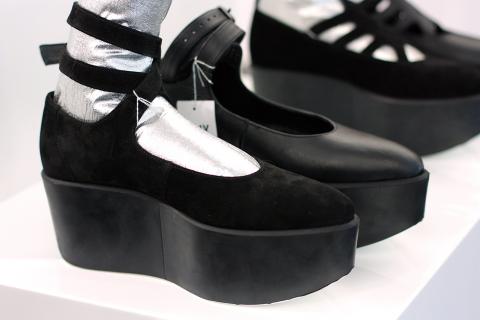
Photo: Catherine Shu, Taipei Times
Another one of Chen’s favorite designers is German-born, Belgium-based Bernhard Willhelm, whose latest collection shows off influences from Chinese and Japanese art.
“I love his use of color. It’s very exuberant and his cuts are also unique,” says Chen of Willhelm’s exaggerated silhouettes.
Willhelm’s prints are inspired by ink paintings or calligraphy, with bold splashes of color set against a contrasting background, while dresses and tops are cut to resemble kimonos. A dusk blue wool A-line coat is given a dash of flair with the Chinese characters for “now” (現在) silk-screened across the front.
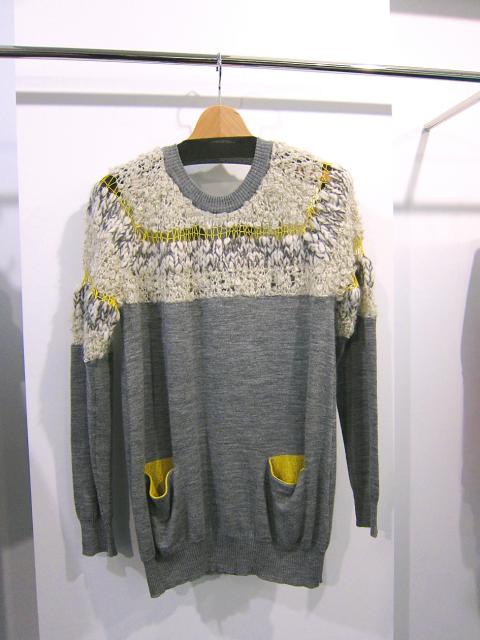
Photo: Catherine Shu, Taipei Times
A tunic with an asymmetrical, gathered hem seems to float above the wearer’s knees like a cloud, while a kelly green cardigan is covered with a lace-like network of holes and rips that make it look like a swarm of artistically minded moths converged on it.
Even Select Shop also carries several lines by emerging designers and independent labels. Despite its name, Japanese brand Bikini doesn’t sell swimwear, but accessories and clothing that show off heavy woolen cloth recycled from American and German military uniforms, like a sweeping double-breasted cape. “Their lines are simple, but they use the very best fabric and materials,” says Chen.
Blank X Marco, another Japanese line, takes a playful approach to avant-garde fashion. One oversized gray sweatshirt features an embroidered motif based on an illustration from a medieval manuscript, while another is covered with wild, freeform embroidery in crewel wools.
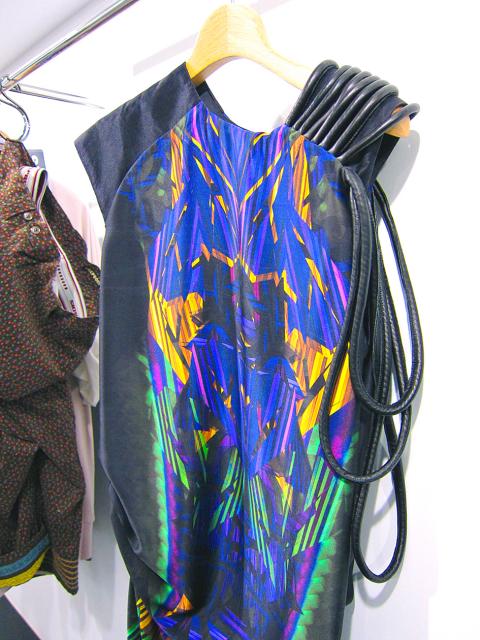
Photo: Catherine Shu, Taipei Times
In addition to Japan, Chen also makes regular buying trips to Europe. Labels she has discovered on those twice-yearly sojourns include London-based Belle Sauvage. Its designs feature crisp, kaleidoscopic digital prints in rich, jewel colors and sharp details, like shoulders sewn from quilted fake leather. German designer Esther Perbandt approaches fabric with a sculptor’s sensibility. Her pieces are mostly monochromatic, in black, white or shades of gray, but highly structured, with unusual tailoring on jackets: origami-like folds or chiffon draped gracefully like the chitons worn by figures in ancient Greek sculpture.
Items in Even Select Shop range in price from NT$2,000 to NT$30,000. Bernhard Willhelm’s line is NT$8,000 to NT$30,000, while Frapbois pieces are NT$3,000 to NT$20,000. Unbilical & Belly Button shoes sell for about NT$10,000 to NT$20,000 per pair.
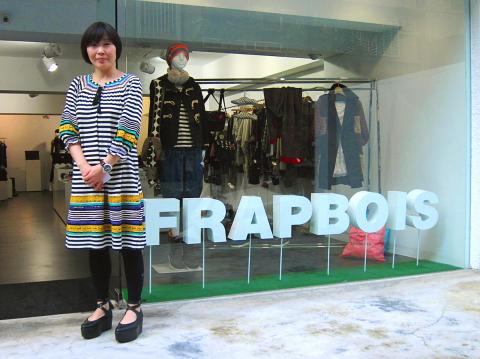
Photo: Catherine Shu, Taipei Times

Dec. 16 to Dec. 22 Growing up in the 1930s, Huang Lin Yu-feng (黃林玉鳳) often used the “fragrance machine” at Ximen Market (西門市場) so that she could go shopping while smelling nice. The contraption, about the size of a photo booth, sprayed perfume for a coin or two and was one of the trendy bazaar’s cutting-edge features. Known today as the Red House (西門紅樓), the market also boasted the coldest fridges, and offered delivery service late into the night during peak summer hours. The most fashionable goods from Japan, Europe and the US were found here, and it buzzed with activity

During the Japanese colonial era, remote mountain villages were almost exclusively populated by indigenous residents. Deep in the mountains of Chiayi County, however, was a settlement of Hakka families who braved the harsh living conditions and relative isolation to eke out a living processing camphor. As the industry declined, the village’s homes and offices were abandoned one by one, leaving us with a glimpse of a lifestyle that no longer exists. Even today, it takes between four and six hours to walk in to Baisyue Village (白雪村), and the village is so far up in the Chiayi mountains that it’s actually

These days, CJ Chen (陳崇仁) can be found driving a taxi in and around Hualien. As a way to earn a living, it’s not his first choice. He’d rather be taking tourists to the region’s attractions, but after a 7.4-magnitude earthquake struck the region on April 3, demand for driver-guides collapsed. In the eight months since the quake, the number of overseas tourists visiting Hualien has declined by “at least 90 percent, because most of them come for Taroko Gorge, not for the east coast or the East Longitudinal Valley,” he says. Chen estimates the drop in domestic sightseers after the

US Indo-Pacific Commander Admiral Samuel Paparo, speaking at the Reagan Defense Forum last week, said the US is confident it can defeat the People’s Republic of China (PRC) in the Pacific, though its advantage is shrinking. Paparo warned that the PRC might launch a “war of necessity” even if it thinks it could not win, a wise observation. As I write, the PRC is carrying out naval and air exercises off its coast that are aimed at Taiwan and other nations threatened by PRC expansionism. A local defense official said that China’s military activity on Monday formed two “walls” east